Clancy Tucker's Blog, page 220
June 6, 2016
7 June 2016 - KIDS & ANIMALS
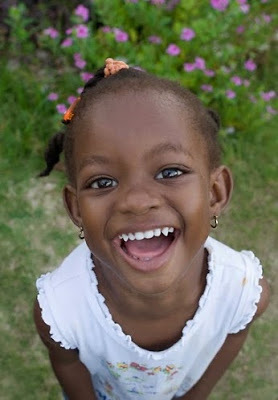
KIDS & ANIMALS
G'day folks,
Here are some pictures of two of my favourite subjects as a photographer.
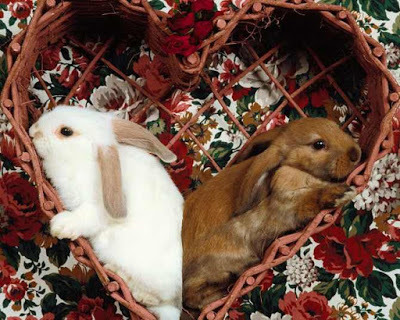



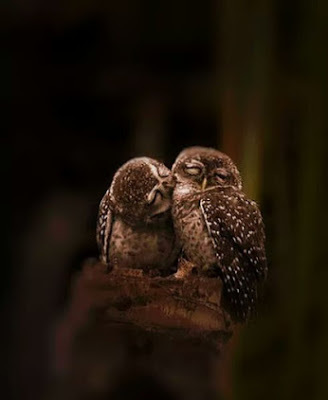
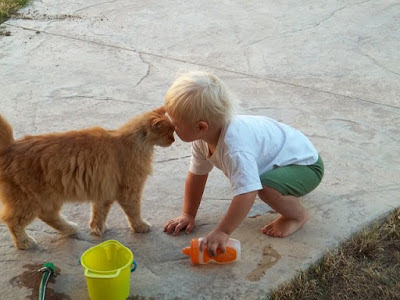
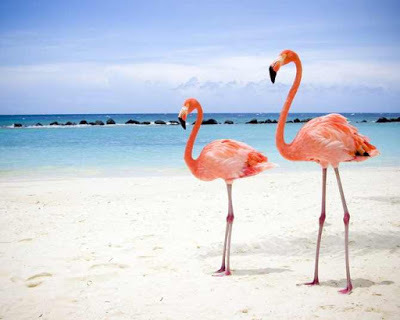

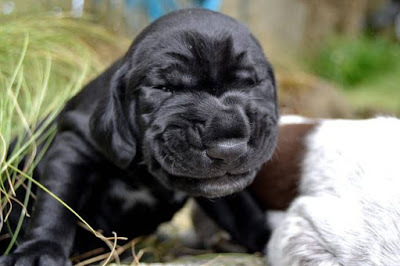


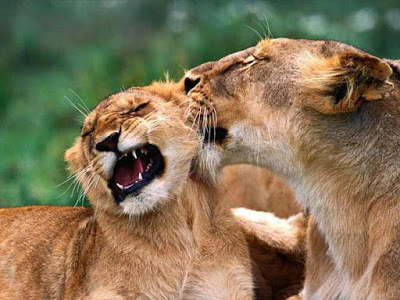
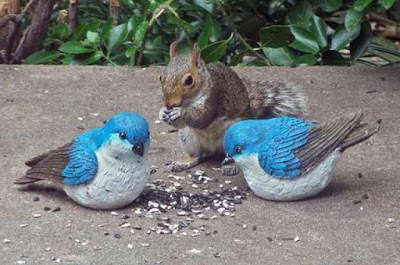

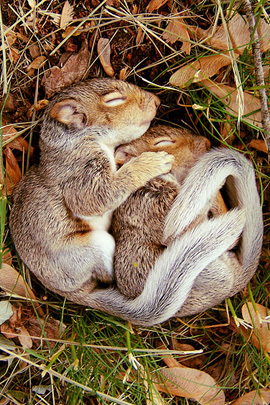




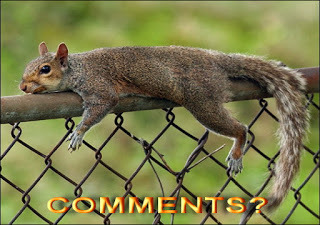
Clancy's comment: Bloody cute, eh?
I'm ....
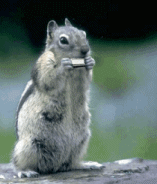
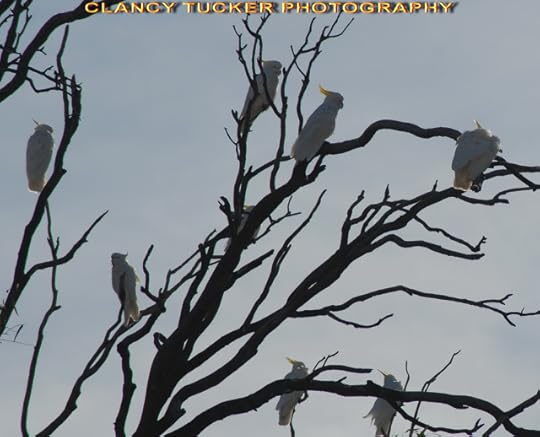
Published on June 06, 2016 15:56
June 5, 2016
6 June 2016 - SIR EDMUND BARTON
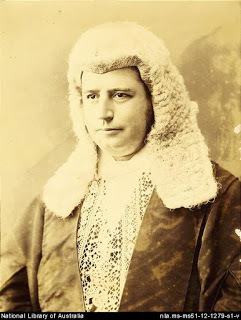
SIR EDMUND BARTON
G'day folks,
Sir Edmund Barton, GCMG, KC was an Australian politician and judge. He served as the first Prime Minister of Australia from 1901 to 1903 and became a founding justice of the High Court of Australia.
Prime Minister from 1 January 1901 to 24 September 1903
Edmund Barton became Australia's first Prime Minister on New Year's Day 1901 at a huge public ceremony in Centennial Park in Sydney.
Barton was certainly qualified for his new job. He'd been a member of the New South Wales parliament for 20 years, and had served terms as Speaker of its Legislative Assembly, Attorney-General and Leader of the Opposition.Barton had worked on Federation for 10 years, and became Australia's first Prime Minister because the supporters of Federation trusted him.
Beginnings
Edmund Barton was born in Glebe, New South Wales, on 18 January 1849. He was one of nine children of William Barton and Mary Louise Whydah, English immigrants who arrived in Australia in 1824. William was a secretary and accountant for an agricultural company, and later became a stockbroker. Mary ran a school for girls.
Barton attended Fort Street School from 1856 to 1858 and then went to Sydney Grammar. He went on to the University of Sydney, from which he graduated with a BA in 1868 and an MA in 1870. He became a barrister in 1871 and set up a successful legal practice. He joined the Sydney Mechanics Institute to learn the art of debating. He married Jane (Jeanie) Mason Ross in 1877, and they had six children.
Barton entered New South Wales colonial politics in 1877, standing unsuccessfully as a candidate for the University seat in the Legislative Assembly, but winning the seat in 1879. He switched to the Wellington seat in 1880, then in 1882 to East Sydney, which he held until 1887.
He was an appointed member of the Legislative Council from 1887 to 1891, then regained East Sydney in 1891, held it until 1894 and then lost it again. He became a member of the Legislative Council again from 1897 to 1898, and was then re-elected to the Legislative Assembly for Hastings-Macleay, which he represented from 1897 to 1899.
He held various positions while a member of colonial parliament, including Speaker of the Legislative Assembly 1883-87, Attorney-General 1889 and 1891-93, and Leader of the Opposition from 1898 to 1899.
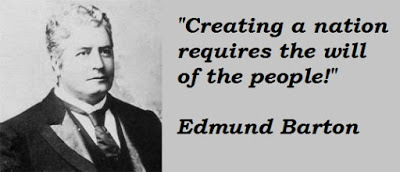
Barton attended the Federal Convention in Sydney in March 1891 as a delegate for New South Wales and was a member of the constitution committee. The idea for a convention had sprung from a speech given at Tenterfield, New South Wales, on 24 October 1889 by Henry Parkes, the 'Father of Federation'. Parkes had called for a strong central federal parliament. The premiers' meeting in Melbourne in February 1890 discussed Parkes' proposals, and agreed to call a Federal Convention the following year.At the first Federal Convention in March 1891, 46 delegates from all six Australian colonies and New Zealand met in Sydney and produced a draft Constitution Bill.
When Parkes lost government in October 1891 he asked Barton, by now a convinced federalist, to take over the leadership of the federal movement. Barton worked tirelessly to promote Federation through the formation of local branches of the Australasian Federal Leagues. From 1893 to 1897 he addressed 300 meetings in New South Wales.
In January 1895 the premiers met in Hobart. They agreed that enabling Acts should be passed in colonial parliaments to allow for popular election of delegates, and for a referendum to approve a draft Constitution. Barton topped the New South Wales poll to elect delegates to the second Federal Convention, gaining 75 per cent of the total votes.
When the second Federal Convention began meeting in March 1897, it appointed Barton 'Leader of the Convention', chairman of the constitutional committee and chairman of the drafting sub-committee.
Barton and his supporters conducted a vigorous pro-Federation campaign preceding the June 1898 referendum on Federation. The Constitution was accepted by the required majority in South Australia, Tasmania and Victoria, but not in New South Wales.
At the New South Wales election in July 1898, dominated by the Federation issue, Barton won the seat of Hastings-Macleay and thus returned to the Legislative Assembly. In September 1898 he replaced the anti-federationist, William Lyne, as opposition leader.
The Premier, George Houston Reid, and Barton worked together to promote the federal cause to the New South Wales electorate. From April to July 1899, a second referendum on Federation was conducted in New South Wales, South Australia, Tasmania and Victoria, each of which accepted an amended Constitution by a larger majority than in June 1898. On 2 September that year, Queensland, voting for the first time, approved the Bill.
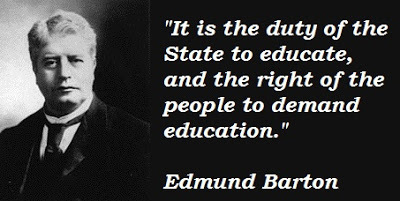
Barton led the Australian delegation to London in early 1900 to negotiate amendments to the Constitution Bill which the UK government wanted, and to oversee the safe passage of the Bill through the UK parliament.
On 9 July 1900 Queen Victoria gave Royal Assent to the Act to constitute the Commonwealth of Australia. On 18 July 1900 Lord Hopetoun, former governor of Victoria (1889-95), was named as inaugural Governor-General of Australia.
Lord Hopetoun arrived in Australia on 15 December 1900, and on 19 December he commissioned New South Wales Premier, William Lyne, to form a federal ministry. His reason for choosing Lyne was his position as the Premier of a 'senior' colony. Lyne, however, was a strong opponent of Federation and no leading federationist would join a government he led. Lyne then advised Hopetoun to commission Barton, who formed the ministry. The ministry (including Lyne in the Home Affairs portfolio) was announced on 30 December.
Prime Minister Edmund Barton
Governor-General Lord Hopetoun commissioned Barton as Australia's first Prime Minister on 31 December 1900.
On Tuesday 1 January 1901 Lord Hopetoun proclaimed the Commonwealth of Australia as a federation of New South Wales, Victoria, South Australia, Queensland, Tasmania and Western Australia (these former colonies are now called states), and swore in Barton's ministry at a huge public Commonwealth inauguration ceremony in Centennial Park, Sydney. A choir of 10,000 sang Advance, Australia Fair, which in 1977 became our national anthem.
Barton gained electoral confirmation of his appointment as Prime Minister when his Protectionists won more seats than either of the other main groupings, Free Traders and Labor, at the first general election on 29-30 March 1901. Barton won the seat of Hunter, New South Wales, and became Minister for External Affairs as well as Prime Minister.
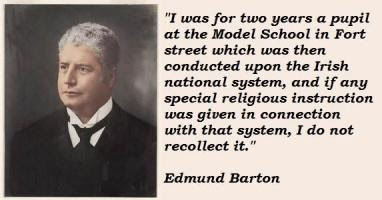
On 9 May 1901 the Duke of York (later King George V) opened the Commonwealth parliament in the Exhibition Building, Melbourne, which became the interim capital. (Federal parliament subsequently met in Victoria's state parliament house.) FW Holder, former Premier of South Australia, was elected the first Speaker of the House of Representatives.
Following a competition for the design of a national flag, for which 32,823 entries were submitted, a flag including elements from the five winning entries was chosen. It was flown officially as the Australian flag for the first time, over the Exhibition Building in Melbourne, on 3 September 1901.
The first budget was presented to federal parliament by the Treasurer, George Turner, on 8 October 1901.
Among the first Acts of Barton's government in 1901 was legislation to restrict immigration, thus instituting the 'White Australia Policy'.
The Commonwealth Franchise Act 1902 established uniform federal franchise. This gave the vote to adult British subjects resident in Australia for at least six months, but excluded Aborigines, Africans and Asians.
The Judiciary Act of Australia became law on 25 August 1903, providing for the establishment of the High Court of Australia.
Barton remained Prime Minister for two years and ten months.
Beyond politics
Barton resigned as Prime Minister on 24 September 1903 to become a foundation member of the newly established High Court of Australia, becoming one of two judges serving with the inaugural Chief Justice SW Griffith.
Barton served on the High Court for over 16 years, until his death on 7 January 1920 at Medlow Bath, New South Wales.
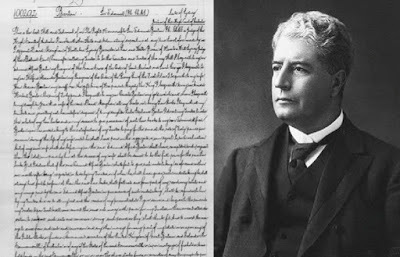
Legislation
The legislative task of the first parliament was to establish a Commonwealth administration. Parliament passed 59 of the 84 bills introduced by the Barton government, including 21 money (appropriation and supply) bills. Other important legislation included:
The Acts Interpretation Act 1901 which was the first bill setting out the standards and conventions for drafting subsequent bills.
The Audit Act 1901 provided for supervision of government spending and reporting to parliament.
The Customs Act 1901 and Excise Act 1901 which were revenue raising Acts.
The Judiciary Act 1903 to set up the High Court.
The Defence Act 1903 to establish control of military and naval forces.
The Immigration Restriction Act 1901 to implement the 'White Australia Policy'.
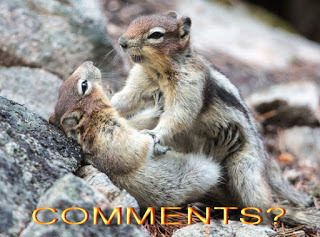
Clancy's comment: Another interesting man. Sadly, many Australian kids, and adults, would not know who he was and what he did.
I'm ...
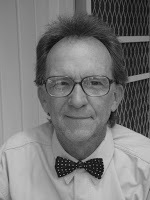

Published on June 05, 2016 15:34
June 4, 2016
5 June 2016 - GREAT THOUGHTS TO PONDER
GREAT THOUGHTSTO PONDER
G'day folk's,
Time to pontificate ... And, smile.
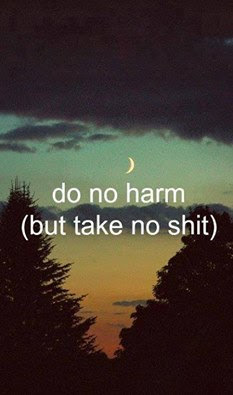
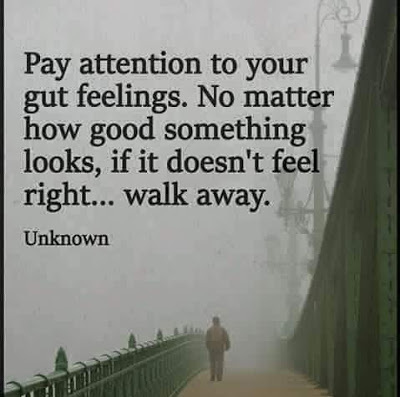









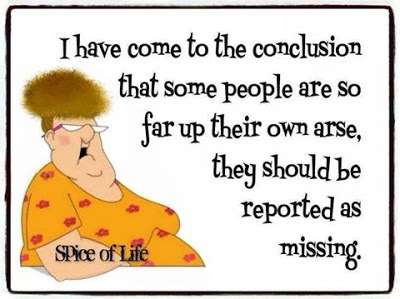
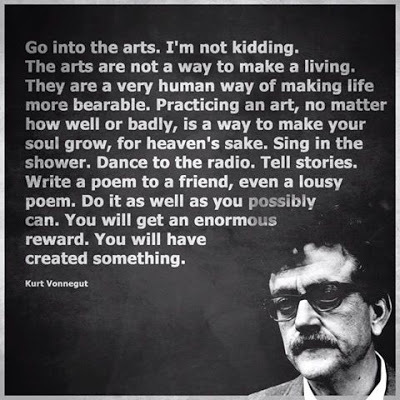





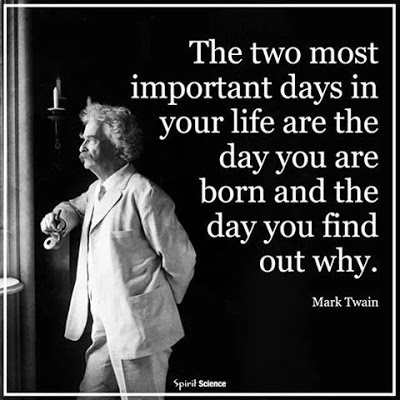
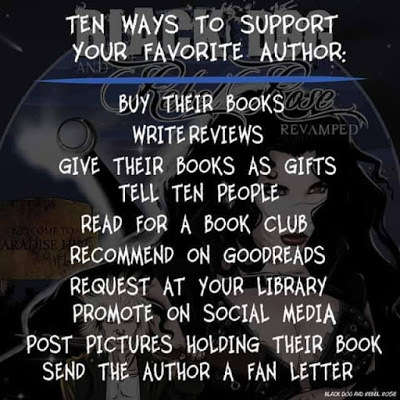


Clancy's comment: Wow. Love some of these. The last one is a clanger.
I'm ...
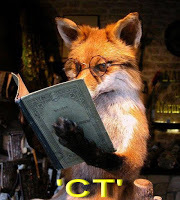

Published on June 04, 2016 15:40
June 3, 2016
4 June 2016 - ANDREW BARTON 'BANJO' PATERSON
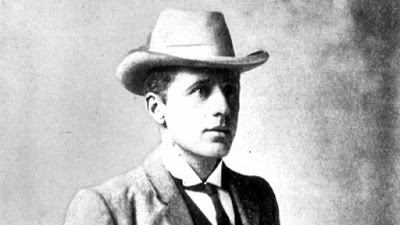
ANDREW BARTON 'BANJO' PATERSON
G'day folks,
Andrew Barton "Banjo" Paterson, CBE was an Australian bush poet, journalist and author. He wrote many ballads and poems about Australian life, focusing particularly on the rural and outback areas. He is one of the best, most famous, and acclaimed of writers in Australia. He is also one of my favourites.
Andrew Barton (Banjo) Paterson (1864-1941), poet, solicitor, journalist, war correspondent and soldier, was born on 17 February 1864 at Narrambla near Orange, New South Wales, eldest of seven children of Andrew Bogle Paterson (d.1889), grazier, and his native-born wife Rose Isabella, daughter of Robert Barton of Boree Nyrang station, near Orange. His father, a lowland Scot, had migrated to New South Wales about 1850, eventually taking up Buckinbah station at Obley in the Orange district.
Barty, as he was known to his family and friends, enjoyed a bush boyhood. When he was 7 the family moved to Illalong in the Yass district. Here, near the main route between Sydney and Melbourne, the exciting traffic of bullock teams, Cobb & Co. coaches, drovers with their mobs of stock, and gold escorts became familiar sights. At picnic race meetings and polo matches, he saw in action accomplished horsemen from the Murrumbidgee and Snowy Mountains country which generated his lifelong enthusiasm for horses and horsemanship and eventually the writing of his famous equestrian ballads.

After lessons in his early years from a governess, once he was able to ride a pony he attended the bush school at Binalong. In 1874 he was sent to Sydney Grammar School where in 1875 he shared the junior Knox prize with (Sir) George Rich, and matriculated aged 16. After failing a University of Sydney scholarship examination, Paterson served the customary articles of clerkship with Herbert Salwey and was admitted as a solicitor on 28 August 1886; for ten years from about 1889 he practised in partnership with John William Street.
As a young man Paterson joined enthusiastically in the Sydney social and sporting scene, and was much sought after for his companionship. Norman Lindsay in Bohemians of the Bulletin (1965) remembered him as a 'tall man with a finely built, muscular body, moving with the ease of perfectly co-ordinated reflexes.
Black hair, dark eyes, a long, finely articulated nose, an ironic mouth, a dark pigmentation of the skin … His eyes, as eyes must be, were his most distinctive feature, slightly hooded, with a glance that looked beyond one as he talked'. Paterson was a keen tennis player and an accomplished oarsman, but his chief delight was horsemanship. He rode to hounds with the Sydney Hunt Club, became one of the colony's best polo players and as an amateur rider competed at Randwick and Rosehill.
During his schooldays in Sydney Paterson lived at Gladesville with his widowed grandmother Emily May Barton, sister of Sir John Darvall and a well-read woman who fostered his love of poetry. His father had had verses published in the Bulletin, soon after its foundation in 1880. Paterson began writing verses as a law student; his first poem, 'El Mahdi to the Australian Troops', was published in the Bulletin in February 1885. Adopting the pen name 'The Banjo' (taken from the name of a station racehorse owned by his family), he became one of that sodality of Bulletin writers and artists for which the 1890s are remarkable in Australian literature, forming friendships with E. J. Brady, Victor Daley, Frank Mahony, Harry 'The Breaker' Morant and others. He helped Henry Lawson to draw up contracts with publishers and indulged in a friendly rhyming battle with him in the Bulletin over the attractions or otherwise of bush life.
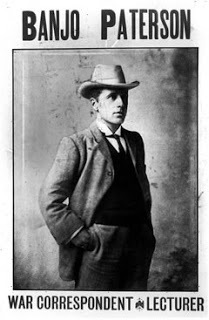
By 1895 such ballads as 'Clancy of the Overflow', 'The Geebung Polo Club', 'The Man from Ironbark', 'How the Favourite Beat Us' and 'Saltbush Bill' were so popular with readers that Angus & Robertson, published the collection, The Man From Snowy River, and Other Verses, in October. The title-poem had swept the colonies when it was first published in April 1890. The book had a remarkable reception: the first edition sold out in the week of publication and 7000 copies in a few months; its particular achievement was to establish the bushman in the national consciousness as a romantic and archetypal figure. The book was as much praised in England as in Australia: The Times compared Paterson with Rudyard Kipling who himself wrote to congratulate the publishers. Paterson's identity as 'The Banjo' was at last revealed and he became a national celebrity overnight.
While on holiday in Queensland late in 1895, Paterson stayed with friends at Dagworth station, near Winton. Here he wrote 'Waltzing Matilda' which was to become Australia's best-known folk song. In the next few years he travelled extensively through the Northern Territory and other areas, writing of his experiences in prose and verse for the Sydney Mail, the Pastoralists' Review, the Australian Town and Country Journal and the Lone Hand, as well as the Bulletin. In 1895 he had collaborated with Ernest Truman in the production of an operatic farce, Club Life, and in 1897 was an editor of the Antipodean, a literary magazine.
His most important journalistic opportunity came with the outbreak of the South African War when he was commissioned by the Sydney Morning Herald and the Melbourne Age as their war correspondent; he sailed for South Africa in October 1899. Attached to General French's column, for nine months Paterson was in the thick of the fighting and his graphic accounts of the key campaigns included the surrender of Bloemfontein (he was the first correspondent to ride into that town), the capture of Pretoria and the relief of Kimberley. The quality of his reporting attracted the notice of the English press and he was appointed as a correspondent also for the international news agency, Reuters, an honour which he especially cherished in his later years. He wrote twelve ballads from his war experiences, the best known of which are 'Johnny Boer' and 'With French to Kimberley'.
Paterson returned to Australia in September 1900 and sailed for China in July 1901 as a roving correspondent for the Sydney Morning Herald. There he met G. E. ('Chinese') Morrison whose exploits he had always admired; his accounts of this meeting are among Paterson's best prose work. He went on to England where he met again his old friend of Bulletin days, the cartoonist Phil May, and spent some time as Kipling's guest at his Sussex home.
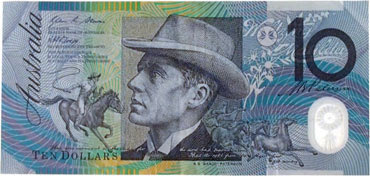
Back in Sydney in 1902, Paterson published another collection, Rio Grande's Last Race, and Other Verses, and in November decided to abandon his legal practice. Next year he was appointed editor of the Sydney Evening News. On 8 April 1903 he married Alice Emily, daughter of W. H. Walker of Tenterfield station. They settled at Woollahra where a daughter Grace was born in 1904 and a son Hugh in 1906. Paterson resigned his editorship in 1908. He had enjoyed his newspaper activities and had produced an edition of folk ballads, Old Bush Songs (1905), which he had researched for some years; he had also written a novel, An Outback Marriage (1906), which had first appeared as a serial in the Melbourne Leader in 1900. But the call of the country could not be resisted and he took over a property of 40,000 acres (16,188 ha), Coodra Vale, near Wee Jasper, where he wrote an unpublished treatise on racehorses and racing. The pastoral venture was not a financial success and Paterson briefly tried wheat-farming near Grenfell.
When World War I began, Paterson immediately sailed for England, hoping unsuccessfully to cover the fighting in Flanders as war correspondent. He drove an ambulance attached to the Australian Voluntary Hospital, Wimereux, France, before returning to Australia early in 1915. As honorary vet (with a certificate of competency) he made three voyages with horses to Africa, China and Egypt and on 18 October was commissioned in the 2nd Remount Unit, Australian Imperial Force.
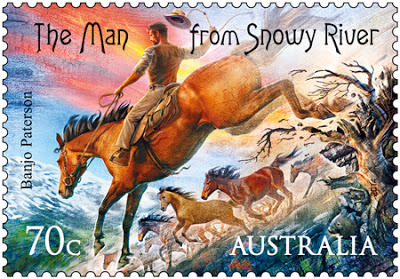
Almost immediately promoted captain, he served in the Middle East. Wounded in April 1916, he rejoined his unit in July. He was ideally suited to his duties and, promoted major, commanded the Australian Remount Squadron from October until he returned to Australia in mid-1919. Angus & Robertson had published in 1917 a further collection of his poems, Saltbush Bill, J.P., and Other Verses, and a prose selection, Three Elephant Power, and Other Stories, heavily edited by A. W. Jose to whom Robertson confided: 'It is amazing that a prince of raconteurs like Banjo should be such a messer with the pen'.
After the war Paterson resumed journalism; he contributed to the Sydney Mail and Smith's Weekly and in 1922 became editor of a racing journal, the Sydney Sportsman—an appointment he found highly congenial. In 1923 most of his poems were assembled in Collected Verse, which has been reprinted many times. He retired from active journalism in 1930 to devote his leisure to creative writing. He was by now a celebrated and respected citizen of Sydney, most often seen at the Australian Club where he had long been a member and where his portrait now hangs. In following years he became a successful broadcaster with the Australian Broadcasting Commission on his travels and experiences. He also wrote his delightfully whimsical book of children's poems, The Animals Noah Forgot (1933). In Happy Dispatches (1934) he described his meetings with the famous, including (Sir) Winston Churchill, Kipling, Morrison, Lady Dudley and British army leaders. He published another novel, The Shearer's Colt (1936), and in 1939 wrote reminiscences for the Sydney Morning Herald. That year he was appointed C.B.E. He died, after a short illness, on 5 February 1941 and was cremated with Presbyterian forms. His wife and children survived him.
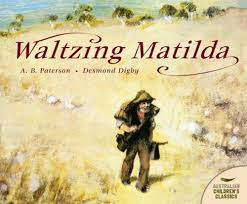
By the verdict of the Australian people, and by his own conduct and precept, Paterson was, in every sense, a great Australian. Ballad-writer, horseman, bushman, overlander, squatter—he helped to make the Australian legend. Yet, in his lifetime, he was a living part of that legend in that, with the rare touch of the genuine folk-poet, and in words that seemed as natural as breathing, he made a balladry of the scattered lives of back-country Australians and immortalized them. He left a legacy for future generations in his objective, if sometimes sardonic, appreciation of the outback: that great hinterland stretching down from the Queensland border through the western plains of New South Wales to the Snowy Mountains—so vast a country that the lonely rider was seen as 'a speck upon a waste of plain'. This was Paterson's land of contrasts: 'the plains are all awave with grass, the skies are deepest blue', but also the 'fiery dust-storm drifting and the mocking mirage shifting'; 'waving grass and forest trees on sunlit plains as wide as seas', but the 'drought fiend' too, and the cattle left lying 'with the crows to watch them dying'.
Although coming from a family of pioneer landholders who, by their industry had achieved some substance, Paterson wrote for all who were battling in the face of flood, drought and disaster. He saw life through the eyes of old Kiley who had to watch the country he had pioneered turned over to the mortgagees, of Saltbush Bill fighting a well-paid overseer for grass for his starving sheep, of Clancy of the Overflow riding contentedly through the smiling western plains:
While the stock are slowly stringing,In such lines as these Paterson lifted the settled gloom from our literature of the bush.
Clancy rides behind them singing,
For the drover's life has pleasures
that the townsfolk never know.
On the night of Paterson's death, Vance Palmer broadcasted a tribute: 'He laid hold both of our affections and imaginations; he made himself a vital part of the country we all know and love, and it would not only have been a poorer country but one far less united in bonds of intimate feeling, if he had never lived and written'.
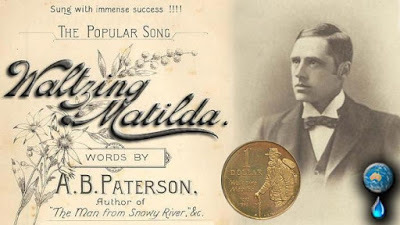
In 1983 his granddaughters published a two-volume complete edition of Paterson's works, including hitherto unpublished material. His portrait by John Longstaff won the 1935 Archibald prize and is in the Art Gallery of New South Wales.

Clancy's comment: Love ya works, Banjo! If you want to read The Man From Snowy River, buy a copy of my book about bullying - KY! The poem is mentioned within the story, and the entire poem is added at the back of the book.
It's my opinion by the way that Waltzing Matilda should be our national anthem. And, some years back, I learnt that the copyright to the words and the song has been owned by an American since about 1929. Amazing. Most people would not know that.
Oh, you can also find out how he got the nickname, 'Banjo', by reading KY!
PS: I've read all of his works at least three times. Bloody brilliant stuff.
I'm ...
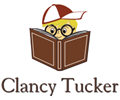
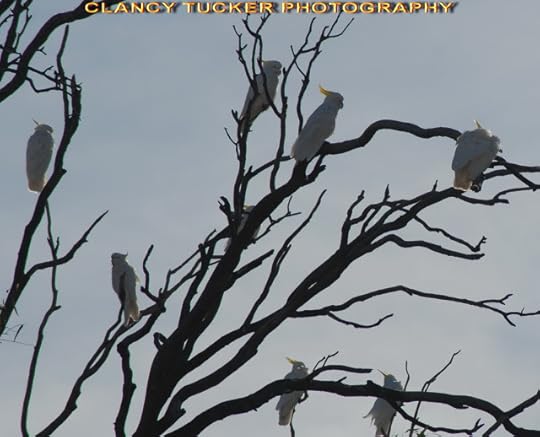
Published on June 03, 2016 16:07
June 2, 2016
3 June 2016 - ROBERT FROST
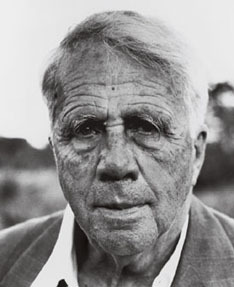
ROBERT FROST
G'day folks,
Robert Lee Frost was an American poet. His work was initially published in England before it was published in America. He is highly regarded for his realistic depictions of rural life and his command of American colloquial speech.
Few poets become household names. Unlike fiction and nonfiction, poetry is an art form consumed (or at least purchased) by a nearly infinitesimal percentage of readers. Consider this: A Poet Laureate of the U.S. may sell a few thousand books in a year, whereas an NFL quarterback may sell half a million copies of his surely ghostwritten autobiography. This should come as no surprise, but it reflects a sobering reality—poets have it rough when it comes to making a name (not to mention a living) for themselves.
Occasionally, though, a poet breaks through the niche, transcends the confining markets of literature students and poetry aficionados, and so captivates the minds and hearts of the general public that he or she becomes a crucial thread in our national, artistic tapestry.
Born in San Francisco on March 26, 1874, Frost grew up in an America besieged by rapid social and scientific change. The Second Industrial Revolution began in 1870 and brought with it advancements in manufacturing and technology that resulted in an America that was ever more urbanized, mechanized, and modernized. These societal changes were surely not lost on Frost, who grew up in the city, but when it came time for him to explore these complexities through his writing, he focused not on factories or steel yards but on the subjects and settings for which we know him best: Northeastern rural life, birch trees, and snow-covered woods. To celebrate Frost’s 142nd birthday, let’s look at some interesting facts about the Bard of New England, one of America’s most towering literary figures.
1. Fame Across the Pond
Frost wrote diligently for years without success. Upon leaving Harvard University in 1899 due to health concerns, he moved with his wife, Elinor, to Derry, New Hampshire, where the couple set up shop at a farm purchased by Robert’s grandfather. For nine years, Frost wrote in the early mornings before heading out to toil on the farm. Some of this work would later be published, but at the time his writing proved unproductive, as did his farming. After a stint in teaching, the Frost family moved across the pond to Beaconsfield, a small town outside of London, in 1912. This jaunt must have been the antidote to Frost’s sluggish writing career —within a year his first book, A Boy’s Will, was published in London, and he was soon rubbing elbows with other poetic titans like Ezra Pound and Edward Thomas. In 1914, just a year before he moved back to America, Frost published North of Boston, and his writing career was officially on the upswing.
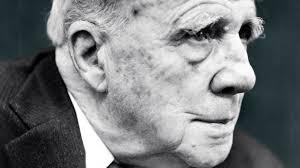
2. Demons Beneath the Surface
Frost’s poems display a sense of rustic tranquility, but close inspection reveals a grim bleakness beneath their pastoral veneer. Novice readers may imagine Frost as a genial daydreamer wandering about in the New England countryside. In reality, though, Frost had a tumultuous life that infused his poetry with tension and musings on death, isolation, and the indifference of the universe.
Life was rough from the start, as Frost was born to an alcoholic father and a depressed mother. His father died of tuberculosis, his mother died of cancer, and in 1920 he committed his sister Jeanie to a mental hospital, where she later died. Robert, his wife, and their daughter Irma (committed to a mental hospital in 1947) suffered from bouts of mental illness throughout life. Only two of Robert’s six children—Irma and Lesley—outlived their father, while the others met unfortunate, premature fates: Eliot died of cholera, Carol committed suicide, Marjorie died of puerperal fever, and Elinor Bettina died three days after her birth. In 1937, Frost’s wife Elinor developed breast cancer and died of heart failure a year later. To Frost, the world could be a capricious and merciless place, and this reckoning with cosmic cruelty seeps into much of his work. (“Once by the Pacific” is a potent example.)
3. Cold War Diplomacy
It’s not often that poets are sent to ease the animosity of two warring superpowers. But in 1962, the 88-year-old Frost (who now had four Pulitzer Prizes) embarked on a goodwill tour of the Soviet Union. Frost imagined “the Russian and the American democracies drawing together,” and he desperately hoped to liaise with then Prime Minister Nikita Khrushchev. The possibility of this meeting was nebulous, but Frost went ahead with his tour of the USSR, giving poetry readings and lectures to enraptured audiences at each stop. Near the end of the trip, Khrushchev agreed to a meeting, but Frost, who was so excited that he developed stomach cramps and fell ill. Nevertheless, Khrushchev came to the guesthouse where Frost was resting. Over an hour and a half, the two men discussed the future of capitalism and socialism, the possibility of reuniting East and West Berlin (Khrushchev said no), and poetry’s relation to national strength. The Cold War continued to simmer, but this rendezvous testifies to the reconciliatory power of literature.
 4. A Political Poet In 1961, John F. Kennedy inherited the Oval Office, and Robert Frost became the first poet to read at a presidential inauguration. This was no accident, for Frost had been vocal in his support for Kennedy, having given his endorsement of the junior senator from Massachusetts before Kennedy had even declared his candidacy. Even before this, however, Frost was well known in Washington, D.C.—he had worked with the Attorney General to secure the release of Ezra Pound (who was under indictment for treason), had read and hobnobbed at the White House, had secured the Consultant in Poetry position by the Library of Congress, had received a Congressional Gold Medal, and had even been named “America’s great poet-philosopher” by the Senate. When Frost died in 1963, it was only natural that JFK and many other government officials paid tribute to a poet who self-admittedly wore his politics on his sleeve.
4. A Political Poet In 1961, John F. Kennedy inherited the Oval Office, and Robert Frost became the first poet to read at a presidential inauguration. This was no accident, for Frost had been vocal in his support for Kennedy, having given his endorsement of the junior senator from Massachusetts before Kennedy had even declared his candidacy. Even before this, however, Frost was well known in Washington, D.C.—he had worked with the Attorney General to secure the release of Ezra Pound (who was under indictment for treason), had read and hobnobbed at the White House, had secured the Consultant in Poetry position by the Library of Congress, had received a Congressional Gold Medal, and had even been named “America’s great poet-philosopher” by the Senate. When Frost died in 1963, it was only natural that JFK and many other government officials paid tribute to a poet who self-admittedly wore his politics on his sleeve.5. The Road Not Taken . . . or Understood? It’s been argued that “The Road Not Taken” is the most recognizable poem of all time. First published in 1916, the narrative poem eventually infiltrated nearly every English classroom and literature anthology. Most readers, even if they are unaware of the source, likely have some recollection of its famous closing lines:
I shall be telling this with a sigh
Somewhere ages and ages hence:
Two roads diverged in a wood, and I –
I took the one less traveled by,
And that has made all the difference.
But recognition doesn’t equal comprehension, according to scholars and even Frost, who viewed his “very tricky” creation as deeply misunderstood. The most common interpretation is that the poem’s narrator—a woodland hiker confronted with a fork in the road—overcomes his instinct to take the common way out of the woods and is satisfied after embracing the challenge of the less-traveled road. Many scholars, however, assert that this interpretation is wrong and at odds with the text itself. In the previous stanza, the reader learns that both roads “equally lay / in leaves no step had trodden black” — that is, they are identical, and it is only “ages and ages hence” when the narrator will sigh and claim he took the road less traveled. Is the poem, then, not an ode to individualism and self-reliance? Is it instead a more complex comment on memory and how we distort and rationalize our choices? You be the judge.

Clancy's comment: Another interesting character.
I'm ...
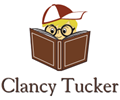

Published on June 02, 2016 15:49
June 1, 2016
2 June 2016 - GREAT QUOTES FROM PAUL KEATING
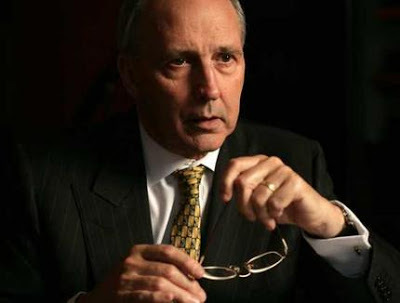
GREAT QUOTESFROM PAUL KEATING
G'day folks,
Welcome to some top quotes from a former Australian Prime Minister - Paul Keating; one of Australia’s sharpest politicians and stand up speakers.
"What we have got is a dead carcass, swinging in the breeze, but nobody will cut it down to replace him."
"He's wound up like a thousand day clock..."
"...the brain-damaged Leader of the Opposition..."
(Of his 1986 leadership) "From this day onwards, Howard will wear his leadership like a crown of thorns, and in the parliament I'll do everything to crucify him."
"He is the greatest job and investment destroyer since the bubonic plague."
"But I will never get to the stage of wanting to lead the nation standing in front of the mirror each morning clipping the eyebrows here and clipping the eyebrows there with Janette and the kids: It's like 'Spot the eyebrows'."
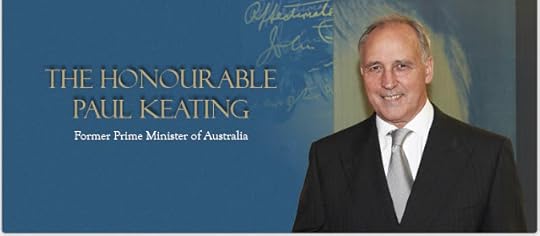
"I am not like the Leader of the Opposition. I did not slither out of the Cabinet room like a mangy maggot..."
"He has more hide than a team of elephants."
"I do not want to hear any mealymouthed talk from the Member for Benelong."
"The principle saboteur, the man with the cheap fistful of dollars."
"Come in sucker."
During Great Debate '96: "You're so rude!"
"Now listen mate," [to John Browne, Minister of Sport, who was proposing a 110 per cent tax deduction for contributions to a Sports Foundation] "you're not getting 110 per cent. You can forget it. This is a fucking Boulevard Hotel special, this is. The trouble is we are dealing with a sports junkie here [gesturing towards Bob Hawke]. I go out for a piss and they pull this one on me. Well that's the last time I leave you two alone. From now on, I'm sticking to you two like shit to a blanket. "
"Old Jellyback."
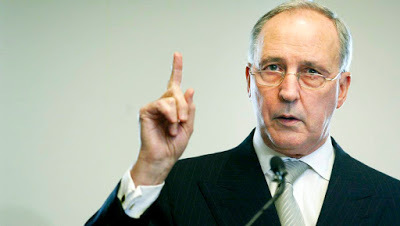
"Old Silver."
"...You stupid foul-mouthed grub."
"Shut up! Sit down and shut up, you pig!"
"You boxhead you wouldn't know. You are flat out counting past ten."
(His performance) is like being flogged with a warm lettuce.
He always turns around when I drop one on him. He can't psychologically handle it.
"There he sits, all dressed up like a Tony Barlow doll but with no place to go.."
I was implying that the Honorable Member for Wentworth was like a lizard on a rock - alive, but looking dead."
"Yesterday, on a personal matter against me, we had old dozy over there, the Honourable Member for Wentworth."
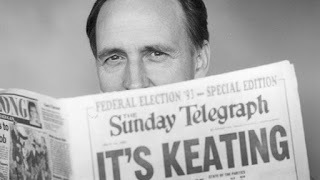
"I have a psychological hold over Hewson... He's like a stone statue in the cemetery."
"I'm not going to be fairy flossed away as my opposite number, John Hewson, is prepared to be fairy flossed away by some spaced out, vacous ad agency. "
"I'd put him in the same class as the rest of them: mediocrity. "
"This is the sort of little-boy, stamp your foot stuff which comes from a financial yuppie when you shoe him into parliament. "
"Hewson's only made the grade on paid advertisements. He's put me under no pressure at all. The only one who's put us under pressure on any issue is Peacock. He's an old cynic and he goes for the issues. Hewson's on television a lot but he hasn't put me under any pressure. "

Clancy's comment: Loved his passion. You either hated him or loved him.
I'm ...

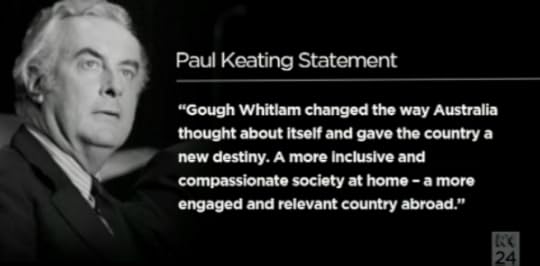
Published on June 01, 2016 15:28
May 31, 2016
1 June 2016 - BETSY SCOTT FITZMEYER - Guest Author
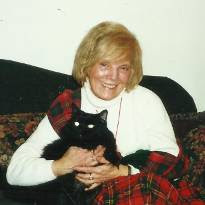
BETSY SCOTT FITZMEYER- Guest Author -
G'day folks,
Today, I interview and author who is 84 years-old.
Welcome, Betsy ...
Tell us a little about yourself and your writing journey.
I was around 20 years old, married at 18 a mother at 19. I seemed to have been a born writer and had always been asked by my teachers to go into writing as a profession. But I had been trained up to be a wife and mother, keeper of the home. When studying piano I was offered a chance to play for a teacher at the Curtis Institute of Music in Philadelphia. It wasn’t a particularly showy piece of music that I had played for a former student at the school, but it seemed to her that the notes I played came from my soul. I was just sixteen and had fallen deeply in love with the man I would marry. When the words, “Marriage will be forgotten for now, possibly in the future…” reached my ears, I shut down any thoughts of a professional career in music and went on to be married and have 4 children.
For good measure, though a promising student, I had quit high school in the 11thgrade.
Back to my 20th year. I had a King James Bible in my hands. I had the question in my mind for God, “Oh, Lord am I good enough to be a writer?” and my finger ready for any answer as I closed my eyes and opened the book. “Write for my words are true and faithful,” was the answer that I was given. I never took down the verse or the book until I was asked for an interview by Mr. Clancy. I knew that my motivation to become a writer would probably be involved in the first question. So at long last I typed into my browser the words I had kept in my brain.
Up came the book and verse, Revelations verse 21. I was absolutely amazed. Still, outside of a poem and two published essays, I went on to have four children. Along the way, I was living in Virginia, across from a community college; the cost of only eight dollars per credit snagged me in to register. Though initially, I was an Architecture Student, I moved on to Interior Design – to the horror of my father, an Architect -, and eventually graduated Summa Cum Laude with an associate degree in Fine Arts.
Sandwiched in the degree were writing courses. Eventually, I went to George Mason University, became a writer for the school newspaper and during my second year was interviewed and chosen to participate in the Michaelmas Honors Term at Oxford. Outside of being a wife and mother, it was at the highlight of my life. My children were grown and off to good starts in their lives and my husband had died. There seemed no reason that I should not enjoy three months of study at the oldest English speaking University in the world.
Of the studies offered, Arthurian History (the search for the real Arthur) and 19thCentury British Fiction Writers, appealed to my interest, to say the least..
When and how did you become a writer.
I became a writer the first day I researched Arthur. There seemed to be an endless volume of notes to take down and study, but little legitimate documentation that the pagans had not destroyed. Still, I had embarked on a quest that had to be put together come what may, so I plodded on.
At this point, I must interject a dream that I had before leaving for England:
It was very dark. A little man, dressed in century’s old clothes and wearing a greenish blue knitted Helmut, was waving me on and pointing to what was obviously a war horse that I should climb aboard. The thing that I most remembered about him is that he seemed to know me, and I him, and that he smiled. While I was doing his bidding in climbing aboard the giant being, my eyes looked to my right and I beheld a magnificent trio of warriors who nodded to me, inviting me to join them as they moved forward to the line of battle. The dream ended there.
During the ensuing years, I would often think of that dream and its meaning.
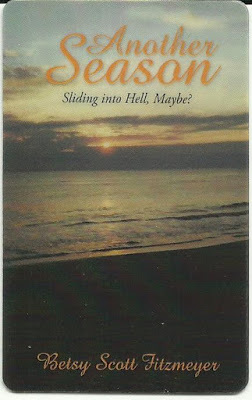
What type of preparation do you do for a manuscript? Do you plan everything first or just shoot from the hip?
The manuscript just takes form in my mind and then I seat myself at the computer and pray in my mind, “Lord, please give me the words.”
What do you enjoy most about being a writer?
Fulfilling a quest to a spiritual truth is the most joyful reward.
What is the hardest thing about being a writer?
The hardest thing about being a writer is to keep true to oneself.
What were you in a past life, before you became a writer?
I like to think that I was an observer, taking in and saving each experience to write about.
What is your greatest writing achievement?
Without a doubt, my greatest writing achievement is my book, ARTHUR. Due to the sparse actual documentation of his life, I had to resort to my making up much of his life. But there is no uncertainty in my mind that he actually existed. He was the greatest defending warrior the world has ever known and has been an inspiration to countless defending warriors that have guarded well the good and decent life enjoyed by free peoples the world over. One of my tutors at Oxford was a reader for the opening chapters of ARTHUR, my senior project at my home university, George Mason.
What are you working on at the moment?
I’m writing a Kindle entitled WORLD WAR II, Through the Eyes of a Child. I had just celebrated my 11th birthday when the bombs fell on Pearl Harbor.
What inspires you?
Good and thoughtful people inspire me. I was around 4 when my father turned on the heavyweight fights on Friday nights. I remember Joe Louis, the greatest fighter the world has ever known to my way of thinking; how he refused to talk to reporters until he had gently talked with his Mom after every fight. I was truly impressed.
What genre do you write?
I do like to write historical books best. I love research; it’s probably the main reason I love delving into history.
Do you have any tips for new writers?
Once you become a writer, never, never give up the blessed quest.
Do you suffer from writer’s block?
No, I don’t really suffer from writer’s block. There is always something to write about.
Do you have a preferred writing schedule?
I usually prefer to write in the early morning; sometimes after dinner.
Do you have a favourite writing place?
Before I got a computer, I used to write long hand on yellow legal pads; since I have had a computer, I type out my thoughts as they come.
Do you have a favourite writing place?
I write at my computer.
What is your greatest joy in writing?
When things are going well, and the words spill out unhampered onto the paper.
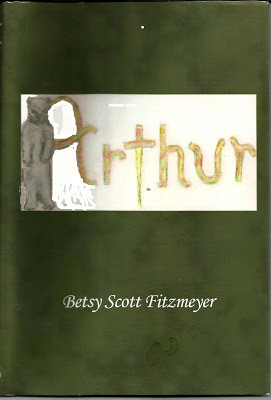
Who is your favourite author and why?
I have two favorite authors, Sir Walter Scott and Jane Austen. I will say this about Sir Walter: He wrote with great passion but never slid into unseemly descriptions that would have upset his audience. He was always known as the father of historical fiction and set the bar high for those who came afterward. As a young girl, I used to love the stories of Goethe about his hero Goetz, the super warrior who defended against any kind of calamity. Sir Walter translated the stories. One wonders if his Ivanhoe was modeled after the beloved German hero.
Jane Austen wrote in the same time period as Sir Walter. I loved her characters and the gentle hazing she meted out to the worst and the praises she bestowed on the best. As I think of it, I do believe that I read all of her books.
What’s the greatest compliment you ever received from a reader?
The greatest compliment that I ever received from a reader was that my writing should be translated to film.
What was the worst comment from a reader?
The worst comment from a reader was that the characters I created deserved more time upon the page.
Writers are sometimes influenced by things that happen in their own lives are you?
I am influenced by things that happen in my own life; my first novel is like reading my live over again and again, although everything the heroine endures did not happen to me.
Other than writing, what else do you love?
I love to paint, especially children. I have been too long without a piano; I would love to play again.
Did you have your book/books professionally edited before publication?
I had my last book professionally edited before publication; just one typo was discovered on the first page.
Describe your perfect day.
My perfect day as I recall was my wedding day. It was June, but rather than a hot day, it was perfection; cool breezes, a cloudless azure sky and a lovely sun beamed down upon Bride Betsy.
If you were stuck on a desert island and with one person, who would it be? Why?
If he were alive, my answer to this question would startle my husband because of reasons I am not going to disclose at this point. But he was the best conversationalist I had ever encountered in life. Being stuck on a desert island demands such a being.
What would you say if you had the chance to speak to world leaders?
If I had the chance to speak with world leaders, I would say “Don’t ever allow your countries to become like the bandit nations the world suffered just before and during World War II.” Our President, Franklin Delano Roosevelt called them, our enemies Germany, Japan, and Italy, our three bandit nations. Why did he call them that? Because they were bad bandits, had no good in them, and wanted to kill the free world.
What are your plans for the future?
I plan a future of writing, if it is in the Master’s plan.
What are your views on book trailers? Do they sell books?
I’m not sure if book trailers sell books or not. I have not looked into having book trailers for any of my books as yet.
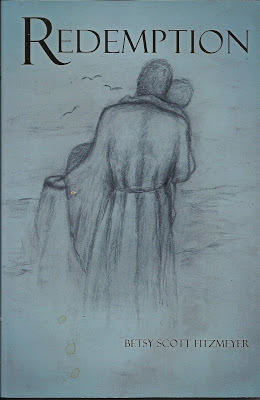
Do you see yourself in any of your characters?
I used to see myself as the heroine of my first novel and fourth. Now, I see myself in Hez, a character in my first and fourth novels.
Does the publishing industry frustrate you?
The publishing industry frustrates me at times, because to my way of thinking, sleaze seems to always sell big-time.
Did you ever think of quitting?
The closest I ever came to quitting was years ago when I cut up my first novel and put it in the garbage. But though it was gone, the novel rolled around in my head until I had written it out again and began sending it around to publishing houses.
What was your favourite manuscript to write and why?
My favourite manuscript to write was ARTHUR. I feel that even though I had to make up quite a lot of it, I felt proud of what I had written. The quest was reached beyond measure, I thought.
How would you define success as a writer?
Success as a writer is defined by earning the respect of an ever expanding audience that one never deceives.
What should readers walk away from your book knowing? How they should feel?
Readers should walk away from my books knowing that they have learned some truths they have never thought about.
Would you like to have your books made into movies? Ever written a screenplay?
I’ve never written a screenplay, but yes, I would like to have my books made into movies.
How much thought goes into designing a book cover?
I already had my book covers in my artist’s paintings, so very little thought went into designing. They were already mine to use.
What’s your ultimate dream?
My ultimate dream is to leave a nice legacy for my children to remember.
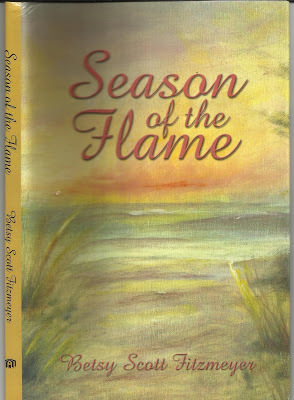
Writing is one thing; what about marketing you, your books and your brand? Any thoughts?
I have had many thoughts about marketing me, my books, and brand. Unfortunately, I have not had the funds for much marketing, I am sorry to say.
Are your books self-published?
In the beginning, some years ago, I had sent off an entire manuscript. It took many months of anxious waiting to get notice that my books had been rejected for one reason or another. One publisher was effusive in his compliments and wished me well. Unfortunately the company wasn’t in the market for other than cook books at the time. So, after many tries, my 80thbirthday loomed on the horizon and I decided the only way to get my books in print before I died was to self-publish.
Describe yourself in five words.
I am ardent, a person who never gives up, the original believer in the good things in life, a constant striver, and a Patriot.
What p’s you off?
The whiners of the world do a great job of making me very mad.
What is the title of the last book you read? Good one?
I am rereading right now a book that I have loved for years. It’s entitled THE DUCHESS of ASHERWOOD, by Mary Garratt. It is a wonderful novel, set in the Regency Age and teaming with the sprightly language of the Ton. It would make an excellent movie!
What would be the very last sentence you’d write?
She went to her Lord gladly, knowing that she had lived life to the fullest and that she had shared her experiences with her appreciative audience.
What would make you happier than you are now?
To have my children tell me that I was a good mother. Jackie Kennedy suggested that if you failed at being a good mother, you failed at life.
Anything you’d like to add?
Yes, I would like to add my prayers for the free world. The last time, during WWII, the free world came together as one against the Nazis, the Empire of Japan, and Italy, the three bandit nations, FDR called them. That unity was wonderful to see and feel.

WEBSITE

Clancy's comment: Go, Betsy! You're an inspiration to young and aspiring writers.
I'm ...


Published on May 31, 2016 15:19
May 30, 2016
31 May 2016 - PATSY CLINE
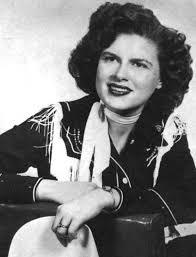
PATSY CLINE
G'day folks,
Here is something for you country music lovers. Patsy Cline was a celebrated country singer best known for her crossover hits, including "Crazy" and "Walking After Midnight."
Synopsis
Patsy Cline was born Virginia Patterson Hensley on September 8, 1932, in Winchester, Virginia. Cline performed for nearly a decade before her breakthrough 1957 television appearance, singing "Walking After Midnight." She went on to many crossover pop and country hits, including "Crazy" and "She's Got You," becoming one of the leading Nashville figures before her death in a plane crash in 1963, in Camden, Tennessee.
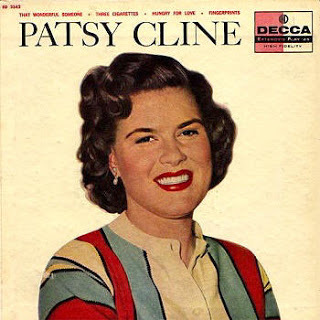
Country music legend Patsy Cline was born Virginia Patterson Hensley on September 8, 1932, in Winchester, Virginia. She helped break down the gender barrier in this musical genre. Known for her smooth-sounding, emotive voice, she started performing at a young age. Her father Samuel was a blacksmith. Her mother Hilda was only 16 years of age when she married Cline's father, who was more than 25 years older than his bride. The couple had three children together before splitting up. Hilda became a seamstress to help support her family.
Cline taught herself how to play piano around the age of 8. She later discovered her passion for singing. When she was sixteen, Cline dropped out of school to go to work. Her family desperately needed the money. She worked a number of places, including a poultry plant and a local soda shop. In her free time, Cline started her singing career. She performed on local radio stations and entered numerous singing contests.
In 1952, Cline began performing with bandleader Bill Peer's group. Peer encouraged her to change her first name to "Patsy" for their performances. She picked up the second part of her now famous moniker the following year after marrying Gerald Cline. Cline landed a recording contract in 1954, but her first few singles failed to catch on.
Cline's career hit a turning point in 1957. She landed a spot on the Arthur Godfrey's Talent Scouts show. Cline wowed audiences with her performance of "Walkin' After Midnight," winning the program's competition. After her appearance on Arthur Godfrey's Talent Scouts, the song hit the country and pop charts. Cline divorced her first husband around this time. She soon married Charles Dick. The couple had two children together, daughter Julie and son Randy.
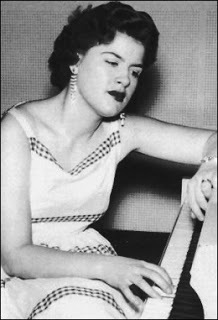
Country Star
In the early 1960s, Cline enjoyed great success on the country and pop charts. She also joined the cast of the Grand Ole Opry in Nashville, Tennessee—a true sign of her place in country music. Now with Decca Records, she released some of her greatest hits. "I Fall to Pieces" hit the top of the country charts in 1961. It also became a top 20 single on the pop charts. Chart success soon struck again with the Willie Nelson-penned "Crazy." That same year, Cline survived a traumatic car crash.
In 1962, Cline again hit the number one spot on the country charts with "She's Got You." She started performing with Johnny Cash around this time, joining his tour. Cline performed with the likes of June Carter and George Jones during this time. She was supportive of other female country artists, such as Loretta Lynn, and she tried to help them with their careers.
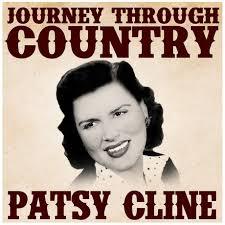
Patsy Cline's own career was all too brief. She died on March 5, 1963, in a plane crash in Camden, Tennessee. After her death, the song "Sweet Dreams" was released and became a hit. Considered one of country music's greatest vocalists, she was inducted into the Country Music Hall of Fame in 1973. Her life became the subject of the 1985 film, Sweet Dreams, starring Jessica Lange. Her music remains popular today with fans around the world. Some of her fans even make the pilgrimage to her hometown of Winchester, Virginia, to visit the Patsy Cline Historic Home.

Clancy's comment: She is still revered in Australia; not that I'm a big country fan. Interesting to count how many singers have been killed in a plane crash. Mm ...
I'm ...


Published on May 30, 2016 15:21
May 29, 2016
30 May 2016 - MORE BRITISH SLANG
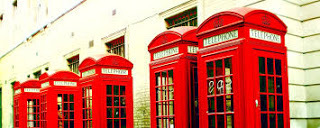
MORE BRITISH SLANG
G'day folks,
I'm always trying to help writers - and add to their vocabulary. Read on ...
Posh - Roughly translates as high class, though if you look at Posh Spice there are clearly exceptions to the rule! Comes from the cabins used by the upper class on early voyages from England to India. The coolest (and most expensive cabins) were Port side on the way Out and Starboard on the way Home.
Potty - This isn't just the thing you sit a toddler on - if you are potty it means you are a little crazy, a bit of a looney, one card short of a full deck.
Pound sign - Ever wondered why Brits flounder when voicemail messages say to press the pound sign? What on earth is the British currency doing on a phone anyway? Well, it isn't. To a Brit, the pound sign is the wiggly thing we use to denote the UK pound (or quid), in the same way you have a dollar sign.
Prat - Yet another mildly insulting name for someone. In fact, this one is a bit ruder than pillock so you probably wouldn't say it in front of Grandma.
PTO - This is an abbreviation for "please turn over". You will see it on forms in the UK where you would see the single word over in the USA.
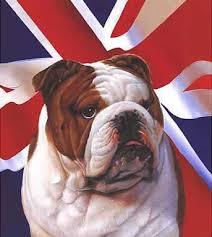
Puff - If a Brit starts giggling in your local drugstore - it may be because they have just found a box of Puffs. To some of us Brits a Puff is another word for a fart. Stems from the cockney rhyming slang, to "Puff a dart".
Pukka - This term has been revived recently by one of our popular young TV chefs. It means super or smashing, which of course is how he describes all his food.
Pull - Me and the lads used to go to the disco when we were on the pull. It means looking for birds. Of course, it works the other way round too. The ladies may also be on the pull, though probably a bit more subtly than the chaps!
Pussy - This is what we call our cat, as in "pussy cat", or in the fairytale, Puss in Boots. So if you have a Brit neighbour who asks if you have seen their pussy - try to keep a straight face and think back the last time you saw their cat!
Put a sock in it - This is one way of telling someone to shut up. Clearly the sock needs to be put in their loud mouth!
Put paid to - This is an expression which means to put an end to something. For example you could say that rain put paid to the cricket match, meaning it stopped play.
Queer - Apart from the obvious gay link, this word used to be used a lot to mean someone looked ill. As in "You look queer". Of course you might not say that these days in case you get either picked up, or thumped!
Quid - A pound in money is called a quid. It is the equivalent to the buck or clam in America. A five pound note is called a fiver and a ten pound note is called a tenner.
Quite - When used alone, this word means the same as absolutely!
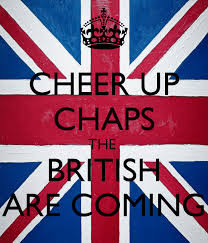
Rat arsed - Yet another term for drunk, sloshed or plastered. You might say loaded. In the UK, loaded is a men's magazine that covers sex and football.
Read - If someone asks you what you read at university, they mean what was your major at school.
Really - This is one of those words where you say almost the same thing as us, but just can't be fagged to finish it off. The word is "really", not real. You say things like it's real hot, something's real cool, a baby is real cute. If we said that we would be sent to the back of the class for our grammar - or lack of it!
Redundancy - If you are made redundant it means you are laid off.
Reverse the charges - When you want to ring someone up and you have no money you can call the operator and ask to reverse the charges in the UK. In the US you would call collect.
Right - I'm feeling right knackered. That would mean you were feeling very tired.
Ring - You would ring someone on the phone not call them, in the UK. Try saying "give me a ring" to the next Brit you meet. This does not work well in reverse. I asked someone in a shop to ring me up and he dragged me to the till and pulled my head across the scanner!
Roger - Same kind of problem that Randy has here, except we have people called Roger and no Randys. You will see a strange smile on the face of a Brit every time "Roger the Rabbit" is mentioned!! To roger means to have your wicked way with a lady. My Oxford English Dictionary says to copulate. You might say screw.
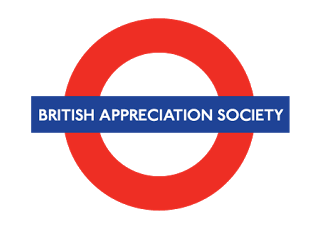
Round - When you hear the words "your round" in the pub, it means it is your turn to buy the drinks for everyone in the group - nothing to do with the size of your tummy! Since beers are more and more expensive these days, the art of buying the rounds has developed into ensuring you buy the first one before everyone has arrived, without being obvious!
Row - Rhymes with "cow" this means an argument. You might hear your Mum having a row with your Dad, or your neighbours might be rowing so loud you can hear them!
Rubbish - The stuff we put in the bin. Trash or garbage to you. You might also accuse someone of talking rubbish.

Clancy's comment: Okay, time to put a sock in it and go ...
I'm ...
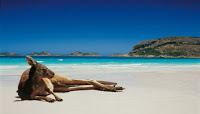

Published on May 29, 2016 15:21
May 28, 2016
29 May 2016 - DOROTHY HEIGHT
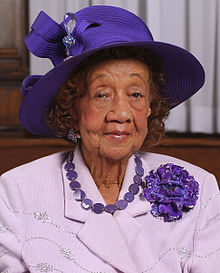
DOROTHY HEIGHT
G'day folks,
Welcome to the life of another great activist. Dorothy Irene Height an American administrator and educator, was a civil rights and women's rights activist specifically focused on the issues of African-American women, including unemployment, illiteracy, and voter awareness.
Dorothy Height was focused primarily on improving the circumstances of and opportunities for African-American women.
“I have been in the proximity of, and threatened by, the Klan; I have been called everything people of color are called; I have been denied admission because of a quota. I've had all of that, but I've also learned that getting bitter is not the way.” —Dorothy Height
Born in Virginia in 1912, Dorothy Height was a civil rights and women's rights activist focused primarily on improving the circumstances of and opportunities for African-American women. She was a leader in addressing the rights of both women and African Americans as the president of the National Council of Negro Women. In the 1990s, she drew young people into her cause in the war against drugs, illiteracy and unemployment. The numerous honors bestowed upon her include the Presidential Medal of Freedom (1994) and the Congressional Gold Medal (2004). She died on April 20, 2010, in Washington, D.C.
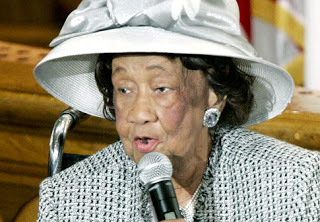
Born on March 24, 1912, in Richmond, Virginia, African-American activist Dorothy Height spent her life fighting for civil rights and women's rights. The daughter of a building contractor and a nurse, Height moved with her family to Rankin, Pennsylvania, in her youth. There, she attended racially integrated schools.
In high school, Height showed great talent as an orator. She also became socially and politically active, participating in anti-lynching campaigns. Height's skills as a speaker took her all the way to a national oratory competition. Winning the event, she was awarded a college scholarship.
Height had applied to and been accepted to Barnard College in New York, but as the start of school neared, the college changed its mind about her admittance, telling Height that they had already met their quota for black students. Undeterred, she applied to New York University, where she would earn two degrees: a bachelor's degree in education in 1930 and a master's degree in psychology in 1932.
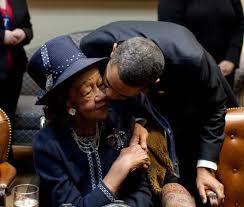
After working for a time as a social worker, Height joined the staff of the Harlem YWCA in 1937. She had a life-changing encounter not long after starting work there. Height met educator and founder of the National Council of Negro Women Mary McLeod Bethune when Bethune and U.S. first lady Eleanor Roosevelt came to visit her facility. Height soon volunteered with the NCNW and became close to McLeod.
One of Height's major accomplishments at the YWCA was directing the integration of all of its centers in 1946. She also established its Center for Racial Justice in 1965, which she ran until 1977. In 1957, Height became the president of the National Council of Negro Women. Through the center and the council, she became one of the leading figures of the Civil Rights Movement. Height worked with Martin Luther King Jr., A. Philip Randolph, Roy Wilkins, Whitney Young, John Lewis and James Farmer—sometimes called the "Big Six" of the Civil Rights Movement—on different campaigns and initiatives.
In 1963, Height was one of the organizers of the famed March on Washington. She stood close to Martin Luther King Jr. when he delivered his "I Have a Dream" speech. Despite her skills as a speaker and a leader, Height was not invited to talk that day.
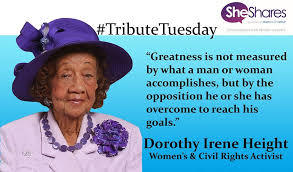
Height later wrote that the March on Washington event had been an eye-opening experience for her. Her male counterparts "were happy to include women in the human family, but there was no question as to who headed the household," she said, according to the Los Angeles Times. Height joined in the fight for women's rights. In 1971, she helped found the National Women's Political Caucus with Gloria Steinem, Betty Friedan and Shirley Chisholm.
While she retired from the YWCA in 1977, Height continued to run the NCNW for two more decades. One of her later projects was focused on strengthening the African-American family. In 1986, Height organized the first Black Family Reunion, a celebration of traditions and values. The event is still held annually.
Height received many honors for her contributions to society. In 1994, President Bill Clinton awarded her the Presidential Medal of Freedom. She stepped down from the presidency of the NCNW in the late 1990s, but remained the organization's chair of the board until her death in 2010. In 2002, Height turned her 90th birthday celebration into a fundraiser for the NCNW; Oprah Winfrey and Don King were among the celebrities who contributed to the event.
In 2004, President George W. Bush gave Height the Congressional Gold Medal. She later befriended the first African-American president of the United States, Barack Obama, who called her "the godmother of the Civil Rights Movement," according to The New York Times. Height died in Washington, D.C., on April 20, 2010.
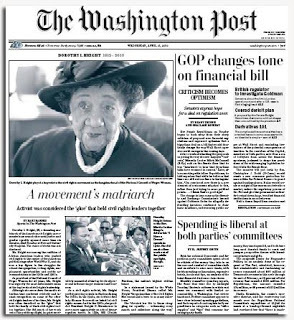
Former first lady Hillary Clinton was among the many who mourned the passing of the famed champion for equality and justice. Clinton told the Washington Postthat Height "understood that women's rights and civil rights are indivisible. She stood up for the rights of women every chance she had."
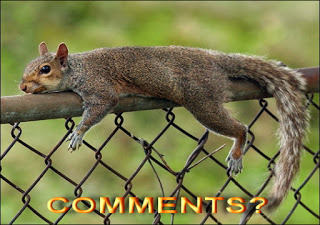 Clancy's comment: Another woman who stood out from the crowd. Good for her. It wouldn't have been easy in those days, for a woman, let alone a black woman, to stand up and be counted.
Clancy's comment: Another woman who stood out from the crowd. Good for her. It wouldn't have been easy in those days, for a woman, let alone a black woman, to stand up and be counted.I'm ...


Published on May 28, 2016 15:58



